
Highgate is a suburban area of north London at the northeastern corner of Hampstead Heath, 4+1⁄2 miles north-northwest of Charing Cross.

Mornington Crescent is a London Underground station in Somers Town in north west London, named after the nearby street. The station is on the Charing Cross branch of the Northern line, between Camden Town and Euston stations. It is in Travelcard Zone 2.

Camden Town, often shortened to Camden, is an area in the London Borough of Camden, around 2.5 miles (4.1 km) north of Charing Cross. Historically in Middlesex, it is the administrative centre of the borough and identified in the London Plan as one of 34 major centres in Greater London.
Somers Town is an inner-city district in North West London. It has been strongly influenced by the three mainline north London railway termini: Euston (1838), St Pancras (1868) and King's Cross (1852), together with the Midland Railway Somers Town Goods Depot (1887) next to St Pancras, where the British Library now stands.

Swiss Cottage is an area of Hampstead in the London Borough of Camden, England. It is centred on the junction of Avenue Road and Finchley Road and includes Swiss Cottage tube station. Swiss Cottage lies 3.25 miles (5.23 km) north-northwest of Charing Cross. The area was named after a public house in the centre of it, known as "Ye Olde Swiss Cottage".It was visited by Queen Victoria’s fourth child.
West Hampstead is an area in the London Borough of Camden in north-west London. Mainly defined by the railway stations of the same name, it is situated between Childs Hill to the north, Frognal and Hampstead to the north-east, Swiss Cottage to the east, South Hampstead to the south-east, Kilburn to the west and south-west, and Cricklewood to the north-west. The area is mainly residential with several small shops, restaurants, cafes, bakeries concentrated on the northern section of West End Lane and around West End Green. It is served by three stations: West Hampstead on the Jubilee line, West Hampstead Overground station and West Hampstead Thameslink station. It is part of the Kilburn postal district (NW6).

Mornington Crescent is a terraced street in Camden Town, Camden, London, England. It was built in the 1820s, on a greenfield site just to the north of central London. Many of the houses were subdivided into flats during the Victorian era, and what was the street's communal garden is now the Carreras Building. Mornington Crescent tube station which opened in 1907, takes its name from the street.

Belsize Park is a residential area of Hampstead in the London Borough of Camden, England.
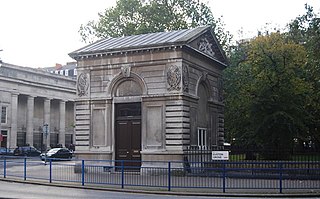
Euston Square is a large square in the London Borough of Camden in Central London. It lies on Euston Road, and Euston railway station and Euston bus station are on its northernmost side. Although “Euston Square” strictly refers to the square, in day to day use the name is often used to refer to Euston Square tube station, whose entrance is at the junction of Euston Road and North Gower Street. The southern half of the square was built over in the 1920s, leaving Euston Square Gardens on the north side in front of Euston station.

London Buses route 24 is a Transport for London contracted bus route in London, England. Running between Pimlico and Hampstead Heath, it is operated by Abellio London.
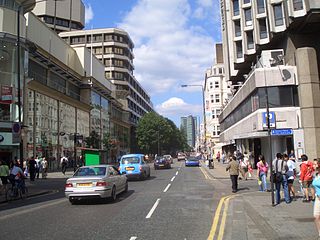
The A400 road is an A road in London that runs from Charing Cross to Archway in North London. It passes some of London's most famous landmarks.
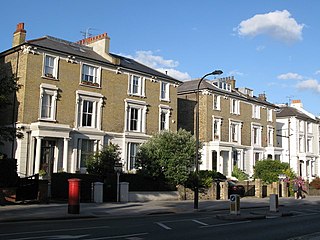
Haverstock is an area of the London Borough of Camden: specifically the east of Belsize Park, north of Chalk Farm and west of Kentish Town. It is centred on Queens Crescent and Malden Road. Gospel Oak is to the north, Camden Town to the south.
The London Borough of Camden was created in 1965 from the former area of the metropolitan boroughs of Hampstead, Holborn, and St Pancras, which had formed part of the County of London. The borough was named after Camden Town, which had gained its name from Charles Pratt, 1st Earl Camden in 1795. Since the 17th century, many famous people have lived in its various districts and neighbourhoods.
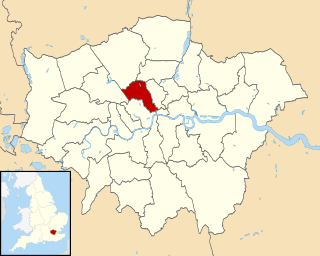
The London Borough of Camden is a London borough in Inner London. Camden Town Hall, on Euston Road, lies 1.4 mi (2.3 km) north of Charing Cross. The borough was established on 1 April 1965 from the area of the former boroughs of Hampstead, Holborn, and St Pancras—which together, prior to that date, had comprised part of the historic County of London.

The Bedford Estate is an estate in central London owned by the Russell family, which holds the peerage title of Duke of Bedford. The estate was originally based in Covent Garden, then stretched to include Bloomsbury in 1669. The Covent Garden property was sold for £2 million in 1913 by Herbrand Russell, 11th Duke of Bedford, to the MP and land speculator Harry Mallaby-Deeley, who sold his option to the Beecham family for £250,000; the sale was finalised in 1918.

The Carreras Cigarette Factory is a large art deco building in Camden, London, in the United Kingdom. It is noted as a striking example of early 20th Century Egyptian Revival architecture. The building was erected in 1926–28 by the Carreras Tobacco Company owned by the Russian-Jewish inventor and philanthropist Bernhard Baron on the communal garden area of Mornington Crescent, to a design by architects M. E. and O. H. Collins and A. G. Porri. It is 550 feet long, and is mainly white.

George William Potter was a builder, estate agent and surveyor in Hampstead, London, whose firm contributed to the modern development of Hampstead and Hampstead Garden Suburb. As a builder, he constructed the houses in Gayton Crescent and Gayton Road. Late in life he wrote two books of recollections of the history of Hampstead.
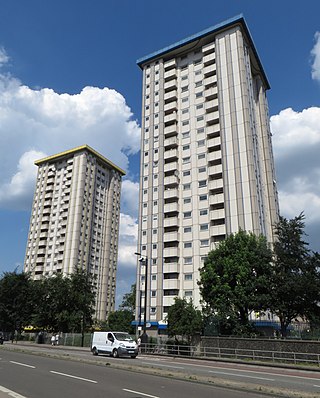
The Ampthill Square Estate, also known as the Ampthill Estate, is a housing estate in the London Borough of Camden in London, England. The estate is located in the Somers Town district, on the south side of Harrington Square, east side of Hampstead Road, and west side of Eversholt Street.

Oakley Square is a crescent-shaped garden square in Somers Town in Central London, close to Mornington Crescent and Camden Town. It is located in the London Borough of Camden and runs roughly northeastwards from Eversholt Street meeting with the southern end of Camden Street on its eastern side.


















